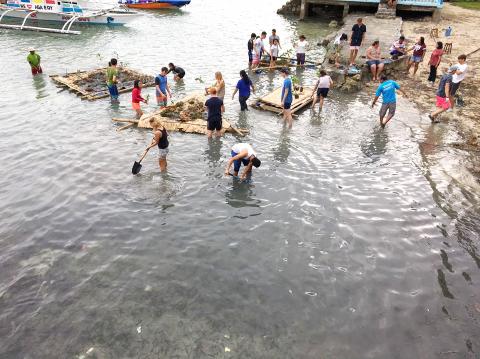Led by Department of Industrial Design visiting professor Bart van Bueren, a team of National Cheng Kung University (NCKU) students in October traveled to Mactan in the central Philippine province of Cebu to construct four floating gardens alongside students from other nations.
The participating universities included Rotterdam University of Applied Sciences (RUAS) and Hanze University of Applied Sciences (HUAS) in the Netherlands, and the University of San Carlos (USC) in the Philippines, NCKU said.
Floating mangroves benefit the environment in many ways, NCKU Department of Hydraulic and Ocean Engineering associate professor Wang Hsiao-wen (王筱雯) said.

Photo courtesy of National Cheng Kung University
They provide all kinds of mangroves and other plants a space to grow, she said, adding that the students had constructed the gardens completely from organic or reusable materials.
The gardens could improve local water quality and even reduce wind-induced waves or modify lowland flooding, Wang added.
The floating gardens can assist in protecting the coastline, increase habitat diversity and beautify the landscape, Wang said, adding that the project has received great reviews from the local government.

Photo courtesy of National Cheng Kung University
The professors and students presented their results at this year’s City Climate Scan Challenge at Cebu City in October.
The four floating gardens built by the students are about 6m2, totaling 25m2, Wang said.
Van Bueren explained the method for creating a floating mangrove garden, and then RUAS’ Tijmen Oudendammer led the team in measuring the clogged plastic pollutants on the riverside, NCKU said.
Using a mobile app, Floris Boogaard measured the water quality and taught the students how to map the floating gardens, NCKU added.
Last year, Wang and Van Bueren led students in constructing floating gardens on Tainan’s Anping Canal (安平運河).

The Chinese military has built landing bridge ships designed to expand its amphibious options for a potential assault on Taiwan, but their combat effectiveness is limited due to their high vulnerability, a defense expert said in an analysis published on Monday. Shen Ming-shih (沈明室), a research fellow at the Institute for National Defense and Security Research, said that the deployment of such vessels as part of the Chinese People’s Liberation Army (PLA) Navy’s East Sea Fleet signals a strong focus on Taiwan. However, the ships are highly vulnerable to precision strikes, which means they could be destroyed before they achieve their intended

The Taiwan Experience Education Program (TEEP) has funded short-term internships in Taiwan for more than 4,500 young people from more than 40 countries since 2015, with the goal of attracting and retaining international talent, the Ministry of Education said yesterday. Fifty-five colleges launched 514 projects this year, including in fields such as semiconductors, artificial intelligence, medicine and biotechnology, green energy, and sustainability, it said. The program provides research and practical internships in Taiwan for two to six months, and offers cultural exchange and networking opportunities, the ministry said. For example, National Formosa University’s Embedded System and Autopilot Laboratory developed two solar-powered drones in

GLOBAL: Although Matsu has limited capacity for large numbers of domestic tourists, it would be a great high-end destination for international travelers, an official said Lienchiang County’s (Matsu) unique landscape and Cold War history give it great potential to be marketed as a destination for international travelers, Tourism Administration Director General Chen Yu-hsiu (陳玉秀) said at the weekend. Tourism officials traveled to the outlying island for the Matsu Biennial, an art festival that started on Friday to celebrate Matsu’s culture, history and landscape. Travelers to Matsu, which lies about 190km northwest of Taipei, must fly or take the state-run New Taima passenger ship. However, flights are often canceled during fog season from April to June. Chen spoke about her vision to promote Matsu as a tourist attraction in

Taipei resident Mu Chu-hua caught some glimpses of China’s mighty military parade on YouTube on Wednesday. As she watched hypersonic missiles roll down Beijing’s Changan Avenue and troops march in lockstep, she did not feel like they posed a threat to Taiwan. Mu, a 69-year-old retiree, said she saw the parade as simply a way for Chinese President Xi Jinping (習近平) to “say thank you to the troops.” “I thought it was quite normal,” she said. “It was very cool.” China’s military parade commemorating the end of World War II was being watched internationally for insights into Beijing’s military advances and its show